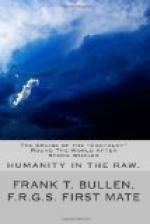In passing, I would like to refer to the wonderful way in which these whales realize at a great distance, if the slightest sound be made, the presence of danger. I do not use the word “hear” because so abnormally small are their organs of hearing, the external opening being quite difficult to find, that I do not believe they can hear at all well. But I firmly believe they possess another sense by means of which they are able to detect any unusual vibration of the waves of either air or sea at a far greater distance than it would be possible for them to hear, Whatever this power may be which they possess, all whalemen are well acquainted with their exercise of it, and always take most elaborate precautions to render their approach to a whale noiseless.
Our extraordinary want of success at last so annoyed the skipper that he determined to quit the ground and go north. The near approach of the open season in those regions probably hastened his decision, but I learned from Goliath that he had always been known as a most fortunate man among the “bowheads,” as the great mysticetae of that part of the Arctic seas are called by the Americans. Not that there is any difference, as far as I have been able to ascertain, between them and the “right” whale of the Greenland seas, but from some caprice of nomenclature for which there is no accounting.
So in leisurely fashion we worked north, keeping, of course, a bright look-out all the way for straggling cachalots, but not seeing any. From scraps of information that in some mysterious fashion leaked out, we learned that we were bound to the Okhotsk Sea, it being no part of the skipper’s intentions to go prowling around Behrings Sea, where he believed the whales to be few and far between.
It may be imagined that we of the crew were not at all pleased with this intelligence, our life being, we considered, sufficiently miserable without the addition of extreme cold, for we did not realize that in the Arctic regions during summer the cold is by no means unbearable, and our imagination pictured a horrible waste of perpetual ice and snow, in the midst of which we should be compelled to freeze while dodging whales through the crevices of the floes. But whether our pictures of the prospects that awaited us were caricatures or no made not the slightest difference. “Growl you may, but go you must” is an old sea-jingle of the truest ring; but, while our going was inevitable, growling was a luxury none of us dare indulge in.
We had by no means a bad passage to the Kuriles, which form a natural barrier enclosing the immense area of the Okhotsk Sea from the vast stretch of the Pacific. Around this great chain of islands the navigation is exceedingly difficult, and dangerous as well, from the ever-varying currents as from the frequent fogs and sudden storms. But these impediments to swift and safe navigation are made light of by the whalemen, who, as I feel never weary of remarking, are the finest navigators in the world where speed is not the first consideration.




